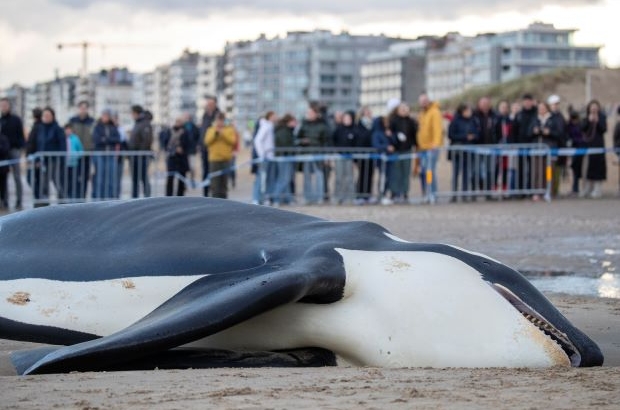- Daily & Weekly newsletters
- Buy & download The Bulletin
- Comment on our articles
Orca washed up on De Panne beach dies after ‘mission impossible’ to save him
Once the male orca washed up onto the beach of De Panne on the Belgian coast on Sunday afternoon, it was almost an impossible mission to save the animal.
“There are few avenues that we can use to save an animal like this,” Kelle Moreau, from the Royal Belgian Institute of Natural Sciences, told RTBF.
A few hours after becoming stranded on the beach at high tide, the six-metre-long killer whale died. Police had set up a perimeter to keep the hundreds of spectators at a safe distance.
The orca was first spotted swimming in the morning near Saint-Idesbald; the first confirmed sighting of such an animal off the Belgian coast since 1850.
“He stayed very close to the coast all the time. He tried to go out to sea a few times, but with the waves it was difficult for him. He kept coming back to the beach all the time,” said Moreau.
Rescue attempt
Rescuers attempted to move the stricken animal away from the coast. “We tried with the rescue services and a small vessel to position ourselves between the animal and the beach to avoid stranding… but it didn’t work,” he explained.
Once the orca was on the beach, he became weaker and there was little chance of saving him. Returning such an animal to the water rarely succeeds. “It’s not impossible, but it’s very difficult,” confirmed Moreau, who pointed out that it didn’t work when an orca became stranded in the Netherlands a year ago.
“There, they tried. They put her back in the water, but two hours later, she was stranded again,” he said. “So, there are unfortunately few realistic avenues to save such an animal,” concluded the expert.
The animal had been named ‘Reveil’ after an event on De Panne beach on Saturday, mayor Bram Degrieck told local media.
Autopsy
An autopsy was due to be conducted on the beach on Monday morning in collaboration with Ghent and Liège universities. It will examine why the animal was swimming so close to the shore.
Orcas live in oceans all over the world, but mainly in colder waters. Although it’s unusual, a few have also been spotted in the southern stretches of the North Sea. They can travel very long distances per day, sometimes up to 150 kms, usually in search of food.
Photo: ©Belga/Nicolas Maeterlinck

















